Student Profiles
Program alumni are the best resources for students interested in going abroad, and they are available to answer your questions. If you would like to talk to a recent student about their experience in Morocco, get in touch with the advisor, Bill Mayers.
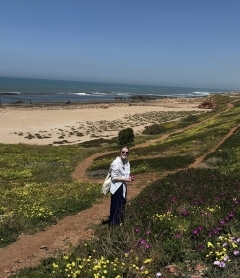
Caelan Stewart, Connecticut College
At our final group meeting, our professors asked us to share our most memorable experiences. Surprisingly, the ones I expected to recall, riding camels in the Sahara or visiting the Old Medina in Fez, didn’t even come to mind. Instead, I thought of joking with neighborhood kids at the basketball court after dinner, crying with laughter while playing a Moroccan card game by lantern light in an Amazigh village, and sharing food with strangers on the train to Tangier as they broke their Ramadan fast.
My classroom experiences were just as impactful. Each day began with Darija class, often alongside our university language partners. Despite the early start, we were eager to learn, motivated by the desire to better connect with the community. Some of my favorite moments were during lunch breaks—sitting with our language partners, eating the lovingly packed meals from our host families, chatting about life, and practicing Arabic together.
Before the program, even after completing the Middlebury Language Summer School, Arabic still felt daunting. I feared it would be a barrier to forming close relationships. But the Language Pledge had the opposite effect. On tram rides to school, we laughed through our imperfect Arabic, excitedly recounting evenings with our host families. Everyone, from baristas to fellow tram passengers, seemed eager to help me practice.
Arabic became my bridge to real connection. Some of my proudest moments came while interviewing people for a class project, speaking with Moroccans from all walks of life. On my first day, I was nervous just directing a taxi to my apartment. By the end of the semester, I was discussing the financial and spiritual impact of Ramadan with drivers for my final paper.
My time at the Middlebury CV Starr School has been nothing short of transformative, both in language learning and in discovering the power of connection across cultures.
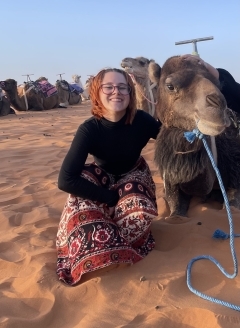
Summer Eaton, Middlebury College
When I first arrived in Morocco, I was terrified; I had never been outside of the US before, and I was struggling to remember any Arabic. What I found, though, was that everyone I spoke to that first day in Morocco not only wanted to, but was happy to help me find my way. As I struggled to express myself, they would try French, Spanish, and English - anything to make sure I got what I needed. And thus began my experience with Moroccans and Morocco as a whole: a bright guiding light in an initially daunting moment.
I found that my host family was one of the best parts of my time abroad. I didn’t speak Darija well at first, but they always made sure to include me in conversations. We had many funny and exciting moments together, like when there was a chicken in our walls; these experiences solidified my love for life in Morocco, as well as the words I learned there. Ramadan in Morocco was an incredible experience, which brought the community and my host family together. As it came time to leave, I realized that part of me would always remain in Morocco. The rolling hills, sandy beaches, and bustling cities would forever be my second home.
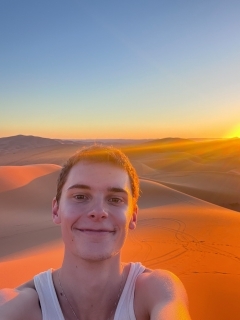
Arthur Koenig, Carleton College
When I arrived in Morocco, I was with another student on the Middlebury program. We had landed late in Casablanca, and needed to get to Rabat by train. We walked through customs, and stopped before we reached the train office. A man sat at his desk, waiting for us to approach, and we looked at each other, terrified. Neither of us could remember the Arabic word for ticket.
Silly translation mistakes or language barriers like this were a fact of my life in Morocco, but I never stopped improving my Arabic, whether with my host family, on my commute to school, or in class with my wonderful instructors. I was welcomed with open arms by my wonderful host family in Rabat. My experiences with them— watching the news over mint tea in the morning, or laughing while we enjoyed a delicious meal at night— made me feel at home in an unfamiliar environment. My professors were experienced and eager to impart their knowledge onto us, helping us to grasp difficult concepts, and pushing us further in our speaking, listening, reading, and writing abilities.
After a few months in Morocco, I knew the word for ticket (and much more). I took a solo trip to Marrakech, and explored the city on foot for three days, talking with locals and bargaining in the souk. One of my favorite parts of my time in Morocco was frequenting my favorite neighborhood cafe. The waiter and some of the regulars began to recognize and greet me when I came in, and after a while, brought me my order without asking. My newfound confidence and ability in Arabic made these unforgettable experiences possible. My time in Morocco taught me so much about language, culture and navigating unfamiliarity, and I can’t wait to return.
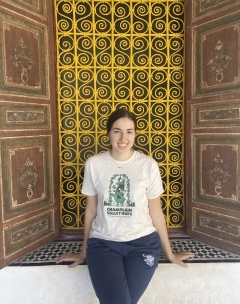
Cleo Baldoumas, Middlebury College
Upon arriving in Morocco with my host family, it became evident that, despite religious and geographic differences, we shared common family dynamics and humor. My younger brother, with his teasing, reminded me of my real brother. The older sister, like my real one, took on a leadership role within the family. Amidst them was the middle sister, Samira, who not only bore a physical resemblance that occasionally confused family friends but also shared traits with me, such as our birth order and a mutual dislike for certain foods and hobbies. Our frequent jokes about being the same person, created a strong sense of connection during my time in Morocco.
In class, my reflective and incredible professor, painted a picture of evolving landscapes through vivid descriptions of her upbringing in a Moroccan village. Rich soils transformed before her eyes into expansive date palm groves amid growing drought concerns. I witnessed similar environmental challenges firsthand during our visit to Oulad Ali, a small village where the once-flowing valley had succumbed to dryness. Yet, amidst the challenges, I witnessed resilience as villagers adapted by sharing water resources to irrigate their farms.
As part of the Middlebury program, we were privileged to stay with a welcoming family, embracing their humble lifestyle for a few days. Picking vegetables and crafting my first tagine with them, I learned that, like me, they omitted meat from their dishes, aligning with my vegetarian preferences. This experience instilled in me a profound appreciation for the simplicity of Moroccan village life, and I now aspire to return to this enriching environment with a deeper understanding and connection.
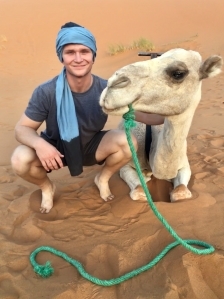
DJ Johnston, Washington & Lee
I had countless opportunities to learn resilience, adaptability, and open-mindedness while living and studying in Rabat. At the beginning of Fall break, for example, I planned to travel to southern Europe via a ferry from the Spanish city of Ceuta on continental Morocco. There was only public transport until Tangier (about an hour away), however, so my host brother contacted a friend in the city he knew from Instagram, Alaeddine, to help me complete the journey.
We spoke throughout the entire trip in Arabic, and we became fast friends. When we arrived at Cueta around 10pm, however, the border was closed. I used my language skills to understand from the officers that illegal immigration had worsened in that area over the past few weeks, and travel across that specific border was forbidden. As we pulled away, Alaeddine looked at me and asked if I believed in destiny. He said we were meant to meet that night, welcomed me into his home, and offered to take me to the airport in the morning. When we arrived at his family’s home, Alaeddine’s mother brought food for us, and we all sat around sharing our interests in Moroccan music and American films until around midnight.
This experience is just one of many (nightly basketball games with neighborhood kids, making friends at the local gym, gaining a new brother from my host family, etc.) that taught me to be proactively cognizant of culture norms, open-minded to the kindness of others, and calmly flexible in the face of relative chaos.
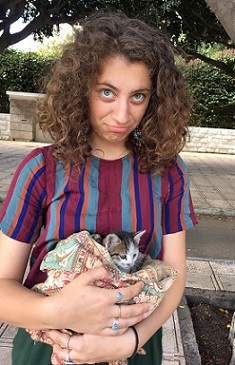
Erin Viola, Tufts University
I chose to study abroad with Middlebury in Morocco because I wanted to improve my Arabic language skills and because I wanted to dedicate significant time to learning about and appreciating a culture very different from my own. I wanted to push myself into engaging Moroccans and other study abroad students in conversations about our cultures and finding new ways to connect. My host mom and I got to talking about our religions and cultures, and shared food on our respective holidays. My entire host family was so eager and willing to talk about life in Morocco and in America, learn about my religion and culture, and try my traditional foods. And of course, we bonded over a mutual dislike for a certain American political figure when we saw him pop up on the evening news. I took so many important lessons with me from my experience in Morocco, and while I achieved many of my linguistic goals, I feel as though my cross-cultural connections with my host family and other Moroccans have made a much bigger impact on who I am today. And yes, I had my fair share of random adventures abroad, like rescuing a kitten (pictured here), made lifelong friends, and enjoyed the fresh produce, beautiful handmade goods, and aromatic dishes of the Maghreb as well.
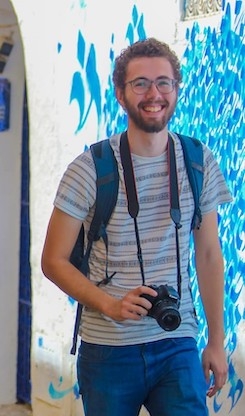
Joseph Hilleary, Bowdoin College
I knew I had made the right choice when I spent two hours talking to my cab driver about his family while winding our way through the Rif Mountains. This may seem unremarkable at first, but the conversation was in Arabic, a language I had studied for two years, but that prior to my time at the Middlebury School in Morocco, I spoke only haltingly. For context, when I first arrived in Morocco and was trying to get from the airport to my homestay, my cab driver eventually had to just call my host family to figure out who I was and where I needed to go, but now, only two months later, I was chatting away naturally for hours at a stretch.
There is no substitute for living, learning, and exploring day in and day out in a language, and Middlebury really facilitated that experience for me. My professors were among the best I have ever had, constantly supporting and challenging me, and I still keep up with some of them to this day. The small class sizes and close, personal instruction helped me to improve my language abilities by leaps and bounds over a relatively short period of time.
Outside of the classroom, my experience in Morocco was incredible. I learned so much just from interacting with Moroccans in a multitude of everyday contexts. Speaking Arabic all the time really opened a lot of doors, and locals were often thrilled that an American was putting in the effort to learn and use their language. Cultural exchange should be at the core of any time spent in another community, and I found that Moroccans time and time again were more than happy to open up and engage with me and my fellow students. Finally, the beauty of the country itself cannot be overstated. From the rocky coastline and the beaches to the Atlas Mountains and the intricate architecture of the old medinas, Morocco is often breathtaking. I have been fortunate enough to return in the years since studying with Middlebury, and since that time, a part of me always feels at home whenever I’m in Rabat.
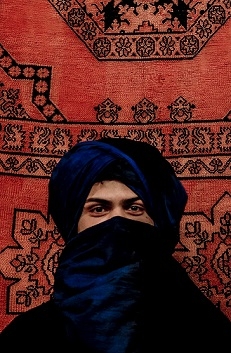
Naina Horning, Middlebury College
Discovery defines the study abroad experience. This includes discovery of the self, others, places, and new ways of thinking. My year-long experience in Morocco comprehensively embodied this concept. Through its diversity of people, cultures, languages, and landscapes, Morocco constantly provided opportunities to discover—be it through through late-night café conversations about life, peaceful reflection under the stars of the Atlas Mountains, or people-watching in the tramway on the way to the University every morning. One of my professors, a sharp and deeply-knowledgeable Berber woman from the area of Errachidia, constantly stressed the complexity of Moroccan society, and by the end of my experience I realized why. In Morocco, religiosity, secularism, tradition and modernity meet, offering a palette of learning opportunities to the unknowing foreigner.
This was not my first time living abroad, but it was the first time I had made a concentrated effort to learn a country’s native language and befriend its people. Like anyone seeing Morocco for the first time, I appreciated Morocco with its dazzling zelleej (tile)-lined mosques, endless supply of inexpensive cafés and mouthwatering rafissa, but learning Moroccan Arabic and making Moroccan friends forged a connection between me and the country that I have been unable to feel elsewhere. I did not realize this until my last week in Morocco, when I returned to Rabat after a month-long adventure in a Berber village. I had no pre-arranged accommodation. Drawing on knowledge and experience I acquired through the Middlebury program and outside of it, I applied everything that I had learned to survive on my own, staying with different friends to suit my tight budget. By the end, I had not only done it, but I had adored it. I felt as though life had just begun, and I knew that I had discovered something special.
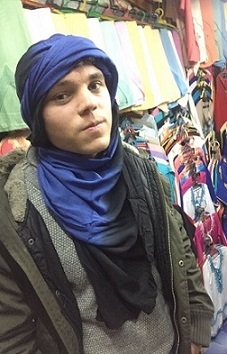
Lorenzo Greenbaum, Middlebury College
Not only did my language skills improve but I also learned a great deal inside and outside the classroom about Moroccan culture. I lived with several host families throughout the year and they would introduce me to friends and other members of the family, and would celebrate with me major holidays such as Eid al-Adha and Eid al-Fitr. Moreover, friends around the neighborhood would invite me to have couscous with them on Friday nights and we would discuss topics about life in Morocco as well as life abroad. I think my favorite part about this whole experience was not the academic opportunities that the program offered, but the ability that learning the local dialect gave me to connect to Moroccans and talk about their dreams and ambitions. One of the moments I will never forget throughout this year was getting to know Moroccans my age in a popular quarter called Takadoum, and hear what they had to say about the world.
